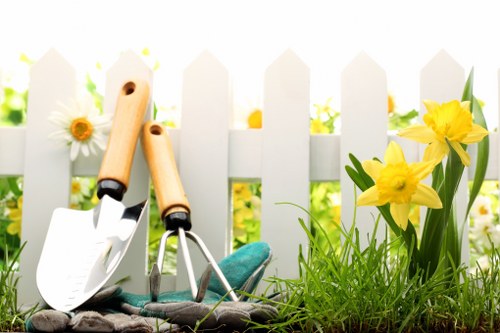Comprehensive Guide to Garden Maintenance in Forest Hill
Introduction to Garden Maintenance

Maintaining a beautiful garden in Forest Hill requires a blend of **dedication**, *knowledge*, and the right set of tools. Whether you're a seasoned gardener or just starting out, understanding the unique climate and soil conditions of Forest Hill is crucial for thriving plant life.
Forest Hill's temperate climate offers a conducive environment for a wide variety of plants. However, challenges such as seasonal variations and local pests require **strategic planning** and consistent care.
In this article, we'll explore the essentials of garden maintenance in Forest Hill, providing you with actionable tips and insights to keep your garden lush and vibrant all year round.
Understanding Forest Hill’s Climate

Forest Hill experiences a mild climate with distinct seasons, which significantly impacts garden maintenance practices. Understanding these climatic nuances can help in selecting the right plants and determining the best times for various gardening activities.
Spring: A period of growth and renewal, ideal for planting new shrubs and perennials. The moderate temperatures and ample rainfall support robust plant development.
Summer: Hot and sometimes dry, requiring diligent watering and mulching to retain soil moisture. It's also the time to manage weeds and prevent pest infestations.
Soil Preparation and Health

A healthy garden starts with healthy soil. In Forest Hill, the soil tends to be rich in organic matter, but it's essential to regularly test and amend it to maintain optimal fertility.
Soil Testing: Conduct soil tests annually to determine pH levels and nutrient composition. This information guides you in adding the right fertilizers and soil conditioners.
Amending Soil: Incorporate compost or well-rotted manure to enhance soil structure and fertility. This also improves water retention and aeration, promoting healthy root growth.
Plant Selection and Care

Choosing the right plants is vital for a thriving garden in Forest Hill. Opt for species that are well-adapted to the local climate and soil conditions.
- Perennials: Offer long-term beauty with minimal maintenance.
- Annuals: Provide vibrant color and can be changed seasonally.
- Shrubs and Trees: Add structure and shade to your garden.
Regular pruning and deadheading encourage healthy growth and prevent overgrowth. Pay attention to each plant’s specific needs regarding sunlight, water, and nutrients.
Watering Techniques

Effective watering is a cornerstone of garden maintenance. In Forest Hill, balancing between adequate hydration and preventing waterlogging is essential.
Drip Irrigation: An efficient way to deliver water directly to plant roots, minimizing evaporation and water waste.
Rainwater Harvesting: Collecting and utilizing rainwater not only conserves resources but also provides plants with naturally soft water, free from chemicals.
Pest and Weed Management
Maintaining a pest-free and weed-free garden ensures that your plants can thrive without competition for nutrients and space.
- Integrated Pest Management (IPM): Combines biological, cultural, and chemical methods to control pests sustainably.
- Mulching: Suppresses weed growth and retains soil moisture.
- Regular Monitoring: Early detection of pests and weeds allows for prompt and effective treatment.
Using natural predators like ladybugs can help manage harmful insects without the need for harsh chemicals.
Lawn Care in Forest Hill
A well-maintained lawn complements the overall beauty of your garden. In Forest Hill, proper lawn care involves regular mowing, fertilizing, and aerating.
Mowing: Keep the grass at an optimal height to promote healthy growth and discourage weeds.
Fertilizing: Use a balanced fertilizer to provide essential nutrients, especially during the growing season.
Seasonal Garden Maintenance
Different seasons bring unique challenges and tasks for garden maintenance. Adapting your maintenance routine to each season ensures year-round garden health.
- Spring: Planting, pruning, and preparing soil.
- Summer: Watering, weeding, and pest control.
- Fall: Leaf removal, planting perennials, and preparing for winter.
- Winter: Protecting plants, planning for the next season, and maintaining tools.
By following a seasonal maintenance schedule, you can address potential issues proactively and maintain a vibrant garden throughout the year.
Tools and Equipment for Garden Maintenance
Having the right tools can make garden maintenance in Forest Hill more efficient and enjoyable. Invest in high-quality tools that suit your gardening needs.
Essential Tools:
- Pruners and shears for trimming plants.
- Spades and trowels for digging and planting.
- Rakes and hoes for soil preparation and weed control.
Advanced Equipment: Consider using automated irrigation systems and lawn mowers to save time and effort.
Regular maintenance of your tools ensures their longevity and effectiveness, making your gardening tasks smoother.
Eco-Friendly Gardening Practices
Adopting sustainable gardening practices not only benefits the environment but also enhances the health of your garden.
Composting: Recycle kitchen and garden waste into nutrient-rich compost to enrich your soil naturally.
Organic Fertilizers: Use natural fertilizers to avoid harmful chemical runoff and promote healthy plant growth.
Water Conservation: Implementing drip irrigation and rainwater harvesting reduces water usage and supports sustainable gardening.
Professional Garden Maintenance Services
Sometimes, enlisting the help of professional garden maintenance services in Forest Hill can save time and ensure your garden remains in top condition.
Professionals offer expertise in areas such as landscape design, pest management, and seasonal maintenance, allowing you to enjoy a beautiful garden without the hassle.
Benefits of Hiring Professionals:
- Expert knowledge and experience.
- Access to specialized tools and equipment.
- Time-saving and efficient maintenance.
If you're overwhelmed with garden tasks or seeking to elevate your garden's aesthetic, consider reaching out to local garden maintenance experts.
DIY vs. Professional Maintenance
Deciding between DIY garden maintenance and hiring professionals depends on your time, expertise, and specific garden needs.
DIY Maintenance: Offers flexibility and personal satisfaction but requires time and knowledge.
Professional Services: Provide convenience and expertise but come at a cost.
Assessing your garden’s requirements and your personal capacity can help you make the best decision for maintaining a healthy and beautiful garden in Forest Hill.
Common Garden Problems in Forest Hill
Gardeners in Forest Hill may encounter various issues, from pest infestations to plant diseases. Identifying and addressing these problems promptly is key to maintaining garden health.
- Pests: Insects like aphids and caterpillars can damage plants.
- Diseases: Fungal infections and bacterial diseases can affect plant vitality.
- Weeds: Compete with desired plants for nutrients and water.
Implementing preventive measures and regular monitoring can mitigate these common garden problems effectively.
Enhancing Garden Aesthetics
Aesthetics play a significant role in garden maintenance. Incorporating elements like decorative plants, pathways, and lighting can elevate the visual appeal of your garden.
Plant Arrangement: Arrange plants in groups based on height, color, and texture to create a harmonious look.
Garden Structures: Adding features like benches, pergolas, and fountains can enhance the garden’s charm and provide functional spaces for relaxation.
Seasonal Planting Tips
Choosing the right plants for each season ensures your garden remains vibrant and healthy throughout the year.
Spring Planting: Focus on perennials, bulbs, and shrubs that thrive in the growing season.
Fall Planting: Plant trees and shrubs that will establish their roots before winter sets in, ensuring resilience in the coming year.
Understanding the growth cycles of plants allows you to plan your garden layout effectively, promoting continuous bloom and greenery.
Mulching Techniques
Mulching is an essential practice in garden maintenance that offers multiple benefits, including moisture retention, temperature regulation, and weed suppression.
Types of Mulch:
- Organic Mulch: Compost, wood chips, and straw enrich the soil as they decompose.
- Inorganic Mulch: Gravel, pebbles, and plastic sheeting provide lasting weed control without adding nutrients.
Application: Apply a 2-3 inch layer of mulch around plants, ensuring not to cover the stems or trunks to prevent rot.
Pruning and Trimming
Regular pruning and trimming are vital for maintaining plant health and encouraging growth. It also helps in shaping plants and preventing diseases.
When to Prune: The best times are typically during late winter or early spring before new growth begins.
Techniques: Use sharp, clean tools to make precise cuts, removing dead or diseased branches and shaping the plant for optimal light exposure.
Weed Control Strategies
Weeds compete with your garden plants for nutrients, water, and light. Effective weed control is essential for a thriving garden.
Manual Removal: Regularly inspect and remove weeds by hand or with tools to prevent them from spreading.
Preventive Measures: Apply mulch and use landscape fabric to reduce weed growth naturally.
Fertilization Best Practices
Proper fertilization provides essential nutrients that promote healthy plant growth and vibrant blooms.
Types of Fertilizers:
- Organic Fertilizers: Compost, manure, and bone meal improve soil health over time.
- Synthetic Fertilizers: Offer immediate nutrient availability but should be used sparingly to avoid soil imbalance.
Application Timing: Fertilize during the active growing seasons, typically spring and summer, to support plant development.
Irrigation Systems
Installing an efficient irrigation system can significantly enhance garden maintenance by ensuring consistent and adequate watering.
Drip Irrigation: Delivers water directly to the plant roots, minimizing evaporation and water waste.
Sprinkler Systems: Suitable for lawns and larger garden areas, providing broad coverage.
Regularly check and maintain irrigation systems to prevent leaks and ensure optimal performance.
Garden Lighting Solutions
Proper lighting not only enhances the aesthetic appeal of your garden but also extends its usability into the evening hours.
Types of Lighting:
- Solar Lights: Eco-friendly and easy to install.
- LED Lights: Energy-efficient and long-lasting.
- String Lights: Add a decorative touch to outdoor spaces.
Placement Tips: Illuminate pathways, focal points, and seating areas to create a welcoming and safe environment.
Maintaining Garden Tools
Proper maintenance of garden tools ensures their longevity and effectiveness, making your garden maintenance tasks easier.
Cleaning: Remove dirt and debris after each use to prevent rust and damage.
Sharpening: Regularly sharpen blades and tools to maintain their cutting efficiency.
Store tools in a dry, organized space to protect them from the elements and reduce wear and tear.
Creating a Garden Maintenance Schedule
A well-structured maintenance schedule helps in organizing tasks and ensures that no aspect of garden care is overlooked.
Daily Tasks: Watering, monitoring for pests, and removing dead leaves.
Weekly Tasks: Weeding, pruning, and fertilizing.
Monthly or Seasonal Tasks: Soil testing, major pruning, and preparing for seasonal changes.
Developing a personalized schedule based on your garden's specific needs can enhance its overall health and appearance.
Benefits of Regular Garden Maintenance
Consistent garden maintenance offers numerous benefits, including enhanced plant health, aesthetic appeal, and increased property value.
- Healthy Plants: Regular care prevents diseases and encourages robust growth.
- Visual Appeal: A well-maintained garden adds beauty and tranquility to your outdoor space.
- Property Value: A lush garden can increase the market value of your home.
Investing time and effort into maintaining your garden pays off in both the short and long term, providing a serene and enjoyable environment.
Conclusion
Garden maintenance in Forest Hill is a rewarding endeavor that combines passion with practical care. By understanding the local climate, preparing the soil, selecting appropriate plants, and following consistent maintenance practices, you can cultivate a garden that thrives and brings joy throughout the year.
Whether you choose to undertake garden maintenance yourself or enlist the help of professionals, the key is to stay informed and proactive. Embrace eco-friendly practices, stay vigilant against pests and weeds, and continually appreciate the beauty your garden offers.
Ready to transform your garden? Contact us today to book your garden maintenance service and take the first step towards a vibrant and thriving outdoor space.